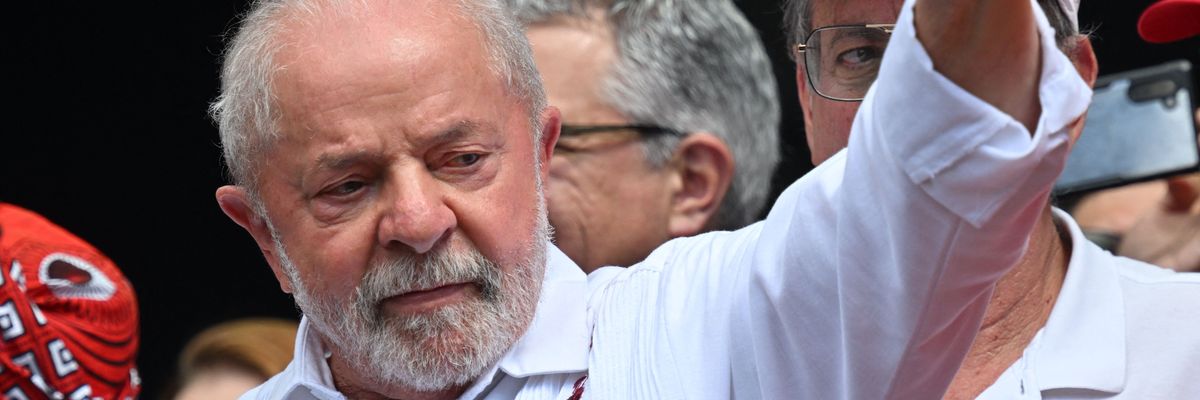Deforestation in Brazil's Amazon rainforest decreased by 68% this April compared with last year, according to preliminary government data published Friday.
The finding reflects positively on the administration of leftist Brazilian President Luiz Inácio Lula da Silva, who has vowed to make the destruction of the crucial ecosystem "a thing of the past."
As Reutersreported:
Official data from space research agency INPE showed that 328.71 square km (126.92 square miles) were cleared in the Brazilian Amazon last month, below the historical average of 455.75 square km for the month.
That interrupted two consecutive months of higher deforestation, with land clearing so far this year now down 40.4% to 1,173 square km.
Lula's victory last October over Brazil's far-right former president, Jair Bolsonaro, was hailed as a critical step toward rescuing the Amazon from more severe and possibly irreversible damage.
Parts of the Amazon, often referred to as the "lungs of the Earth" due to its unparalleled capacity to provide oxygen and absorb planet-heating carbon dioxide, recently passed a key tipping point after Bolsonaro intensified clearcutting of the tropical rainforest during his four-year reign. Bolsonaro's regressive policy changes pushed deforestation in Brazil to a 15-year high last year, helping to drive the country's greenhouse gas emissions to their highest level in almost two decades.
Most of the deforestation that occurred under Bolsonaro was illegal, fueled by logging, mining, and agribusiness companies that were given a green light by the ex-president and often used violence to repress Indigenous forest dwellers and other environmental defenders.
During a November speech at the United Nations COP27 climate summit in Egypt—his first on the international stage after defeating Bolsonaro—Lula said that "there's no climate security for the world without a protected Amazon," roughly 60% of which is located in Brazil.
"The crimes that happened [under Bolsonaro] will now be combated," said Lula, a Workers' Party member who previously served as Brazil's president from 2003 to 2010 and took office again on January 1. "We will rebuild our enforcement capabilities and monitoring systems that were dismantled during the past four years."
"We will fight hard against illegal deforestation. We will take care of Indigenous people," said Lula, who drastically reduced both deforestation and inequality when he governed the country earlier this century. "Brazil is emerging from the cocoon to which it has been subjected for the last four years."
As Reuters noted Friday, "Experts say it is still too early to confirm a downward trend, as the annual peak in deforestation from July to September lies ahead, but see it as a positive signal after rainforest destruction rocketed in late 2022."
"There are several factors, and the change in government might indeed be one of them," Daniel Silva, a conservation specialist at WWF-Brasil, told the outlet. "The environmental agenda has been resumed, but we know time is necessary for the results to be reaped."
"The environmental agenda has been resumed, but we know time is necessary for the results to be reaped."
Friends of the Earth campaigner and author Guy Shrubsole was quicker to give Lula credit.
"Still a lot more to do but this is the impact of electing an environmentalist like Lula over a right-wing populist like Bolsonaro," tweeted Shrubsole, whose books include The Lost Rainforests of Britain and Who Owns England?
Lula has taken important steps toward fulfilling his pledge to halt deforestation by 2030, though Reuters reported that the president "has faced continued challenges since taking office as [the] environmental agency IBAMA grapples with lack of staff," one lingering consequence of his predecessor's funding cuts.
Earlier this month, Lula secured "an 80 million-pound ($100.97 million) contribution from Britain to the Amazon Fund, an initiative aimed at fighting deforestation also backed by Norway, Germany, and the United States," Reuters noted. Last month, he "resumed the recognition of Indigenous lands, reversing a Bolsonaro policy, while announcing new job openings at the environment ministry and [the] Indigenous agency FUNAI."
Research has shown that granting land tenure to Indigenous communities is associated with improved forest outcomes.
Lula fully expected to face substantial opposition from corporate interests and right-wing Brazilian legislators.
The Washington Postreported last year that "a bloc of lawmakers with ties to agriculture could try to block Lula's environmental policies and pass legislation to facilitate land-grabbing and illegal mining."
Vox also explained that "deforestation is unlikely to stop altogether once Lula takes office."
"Bolsonaro's party still dominates Congress and will likely continue supporting the cattle industry, which is behind nearly all forest loss in the Brazilian Amazon," the outlet pointed out. "The country also faces an economic crisis and fallout from mismanaging the coronavirus pandemic, and it's not clear exactly how Lula will prioritize these competing crises."
Despite scientists' warnings that it will be virtually impossible to avert the worst consequences of the climate and biodiversity crises unless the world stops felling trees to make space for cattle ranching, monocropping, and other harmful practices, global efforts to reverse deforestation by 2030 are currently behind schedule and woefully underfunded.
